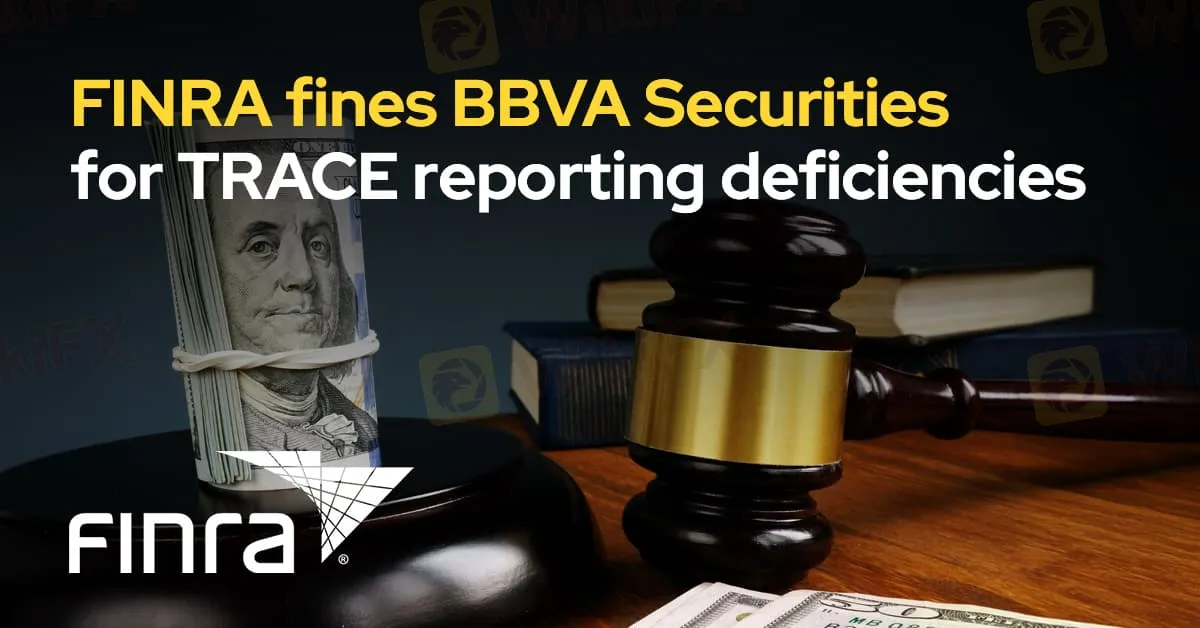简体中文
繁體中文
English
Pусский
日本語
ภาษาไทย
Tiếng Việt
Bahasa Indonesia
Español
हिन्दी
Filippiiniläinen
Français
Deutsch
Português
Türkçe
한국어
العربية
FINRA Fines BBVA Securities for TRACE Reporting Deficiencies
Abstract:BBVA Securities Inc. has been fined $175,000 by the Financial Industry Regulatory Authority (FINRA) as part of a settlement over deficiencies in its Trade Reporting and Compliance Engine (TRACE) reporting. The penalty comes after an investigation revealed significant lapses in BBVA's compliance with FINRA's reporting requirements.

BBVA Securities Inc. has been fined $175,000 by the Financial Industry Regulatory Authority (FINRA) as part of a settlement over deficiencies in its Trade Reporting and Compliance Engine (TRACE) reporting. The penalty comes after an investigation revealed significant lapses in BBVA's compliance with FINRA's reporting requirements.
Between July 2016 and January 2023, BBVA Securities failed to include a required indicator on approximately 50,000 TRACE reports. This omission was a direct violation of FINRA Rule 6730, which mandates the inclusion of specific indicators to ensure accurate and complete trade reporting.
The investigation also uncovered that BBVA Securities had not established or maintained a supervisory system adequate to ensure compliance with TRACE reporting requirements. This failure included a lack of effective written supervisory procedures designed to meet the standards outlined in FINRA Rule 6730.
Moreover, BBVA Securities did not review its TRACE reports for accuracy, which would have included verifying the presence of required indicators. This oversight resulted in violations of FINRA Rules 3110 and 2010, which mandate proper supervisory systems and adherence to regulatory requirements.
In addition to the $175,000 fine, BBVA Securities has agreed to a censure as part of the settlement. The censure serves as an official reprimand and a formal acknowledgment of the firm's regulatory shortcomings.
This settlement underscores the importance of robust supervisory systems and accurate trade reporting. FINRA's action highlights the need for financial firms to adhere strictly to reporting requirements and maintain effective compliance practices to avoid significant penalties.

Disclaimer:
The views in this article only represent the author's personal views, and do not constitute investment advice on this platform. This platform does not guarantee the accuracy, completeness and timeliness of the information in the article, and will not be liable for any loss caused by the use of or reliance on the information in the article.
Read more

OctaFX Flagged by Malaysian Authorities
OctaFX has been officially listed on warning lists by both Bank Negara Malaysia (BNM) and the Securities Commission Malaysia (SC). These alerts raise serious concerns about the broker’s status and whether it is legally allowed to operate in Malaysia.

Why Your Worst Enemy in Trading Might Be You
Be Honest With Yourself: Are You Slowly Destroying Your Trading Account?

TradingPRO: A Closer Look at Its Licences
In an industry where safety and transparency are essential, the regulatory status of online brokers has never been more important. For traders seeking to protect their capital, ensuring that a platform operates under recognised and stringent oversight can make all the difference. Keep reading to learn more about TradingPRO and its licenses.

New SEBI Regulations on Intraday Trading
The Securities and Exchange Board of India (SEBI) has implemented revised regulations on Intraday trading, with effect from November 20, 2024. These regulations are meant to lessen risks and prevent speculative trading practices.
WikiFX Broker
Latest News
SkyLine Guide 2025 Malaysia: 100 Esteemed Judges Successfully Assembled
Vantage Markets Review 2025: Trusted Forex and CFD Trading Since 2009
Why STARTRADER Is Popular Among Traders?
A Guide to Intraday Forex Trading You Can't Miss Out
CONSOB Blocks Access to 13 Unauthorized Investment Websites
TradingPRO: A Closer Look at Its Licences
The world could be facing another ‘China shock,’ but it comes with a silver-lining
New SEBI Regulations on Intraday Trading
Everything You need to know about Barath Trade
IronFX Broker Review 2025: A Comprehensive Analysis of Trustworthiness and Performance
Currency Calculator


